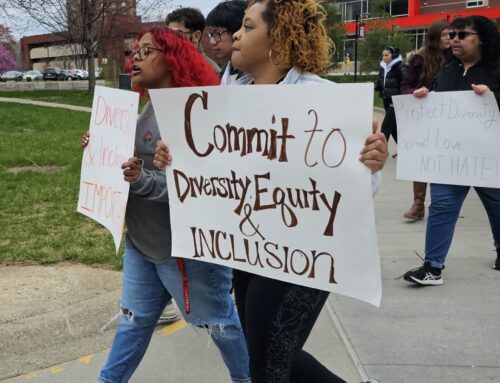Chinese political dissident sheds light on re-education camps
By Simon Isham–
Laogai. It is a word that most outside of China have never seen before, and yet is a word that can be found in America’s Merriam-Webster, France’s Larousse, and Germany’s Duden dictionairies. As of 1990, however, the word lost its Chinese meaning—at least in the eyes of the government. Laogai is the abbreviated form of the phrase “laodong gaizao,” which translates to “reform through labor.”
The introductory paragraph of the Chinese Wikipedia page for laogai said, “Laodong gaizao refers to laogai, meaning the management of lawbreakers in the People’s Republic of China. It often appears on banners and in slogans of prisons where the punishment is physical labor overseen by the prisons’ wardens. Chinese at home and abroad often confuse the terms ‘lao(dong) gai(zao)’ and ‘lao(dong) jiao(yang).’ Chinese officials often refer to them collectively as the ‘labor camps,’ but the two are completely different. The latter is a kind of administrative punishment system.”
A parenthetical statement here on an alternate, baidu.com version of this article reads, “The U.S. judiciary system also uses reform through labor as a punishment, but they do not call it that.”
Further down on that same page, the author of the article references Chinese dissident and former political prisoner Harry Wu. Wu is the creator of the Laogai Research Foundation, and the man who in 2003 convinced the Concise Oxford English Dictionary to include the word “laogai” in its lexicon, making it the first dictionary to do so. Since then, other dictionaries from all over the world have followed suit, furthering Wu’s goal “to see ’laogai’ become recognized in every language.”
It is also Wu’s goal to spread the word. On Wednesday, Jan. 23 at 7 p.m., Wu addressed an audience of over 100 students, faculty, staff and members of the public in the Brown and Williamson Club at Papa John’s Cardinal Stadium.
The first of many speakers to address the audience before Wu’s scheduled speech was Dr. Jason Abbot, the director of U of L’s Center for Asian Democracy, the organization which hosted the event, which was its second annual lecture on Asian democracy. Abbot quickly handed the podium over to Dr. Mordean Taylor-Archer, the university’s Vice-Provost of Diversity and International Affairs, who greeted Wu on behalf of the university, and Gil Reyes, aide to Representative John Yarmuth, who read a letter addressed to the audience from the congressman. Yarmuth’s letter contained a brief summary of Wu’s achievements, as well as a thank-you to the audience.
Suhas Kulkarni, director of Metro Louisville’s Office for Globalization, spoke next, bringing the greetings the city of Louisville and its mayor, Greg Fischer. Kulkarni expressed his hope that Wu’s lecture would “take our democracy to becoming more and more strong. As a city, we are totally committed to increasing the exposure our citizens get to the entire world, and as many agencies get together, including the University of Louisville, it’s absolutely wonderful for the city.”
After Kulkami’s segment, Abbot resumed the dais to introduce the keynote speaker and the subject matter at hand. “One of the principal functions of the Center for Asian Democracy is to promote public awareness of the struggle for democracy in Asia,” he said. “While there are several thriving and successful democratic countries in Asia today, it nevertheless remains home to some of the world’s most closed political systems, where authoritarianism and the abuse of human rights is widespread.
“Tonight, we turn our attention to both the largest and the most important country in that region, China, a country that since 1949 has been a one-party state under the Chinese Communist Party. Tonight, we are very pleased to welcome one of its most outspoken critics, Harry Wu, as our speaker.”
The banner advertisement produced by the CAD had listed the title of Wu’s lecture as “In the Mouth of the Dragon: U.S. and China Relations in the 21st Century;” however, when Wu arrived on stage, the title slide of his presentation proclaimed the subject of his lecture as the more-accurate “My Life in the Chinese Gulag.”
Wu’s family was both wealthy and Roman Catholic; neither of these facts much endeared them to the Communist Party that had taken over the country in full by1950. These traits alone flagged him as a “white student,” or a student whose connections might cause him to harbor counter-revolutionist sentiments.
During Chairman Mao’s brief Hundred Flowers Campaign of 1956, the wealthy and intellectual were encouraged to voice their true beliefs about the party,
under the promise of creating a more perfect socialism. Wu spoke out, and when later that year Mao reversed the policy, saying that the party’s enemies had now identified themselves, Wu was arrested and sent to a laogai camp.
“The police came in. They didn’t have any guns, only uniforms and paper. They told me I had to sign it, or I would have to go with them. I don’t know what I signed even now. Then they took me to camp … I told them I didn’t have any (inclination) to oppose the party, but they said, ‘It doesn’t matter. You have to confess about your character,’ about the nature of our so-called bourgeois-ness.”
Wu was 23, and was to spend another 19 years in the laogai camp system.
He had brought a copy of Victor Hugo’s “Les Miserables” with him to the laogai camp, and had attempted to keep it hidden, “but security found it. They took it, forced me to kneel down, broke my arm and burned the book. What is my skill?” he said. “I cannot read—I have no books. I cannot write—I have no pen or paper. My skill? I can teach you how to catch frogs. How to find rice. How to find a snake … My concern every day was finding food.”
But food could only be found during free time at the laogai camp, and free time was not plentiful; the prisoners stuck to strict work schedules. Wu said that the free labor at laogai camps was used to make a variety of products, such as “Christmas lights, rubber boots, automotive parts, electronics, whatever,” and that “many of these products were for export to the United States.” He attests that the Three Gorges Dam in Hubei, which was completed in 2012, used primarily laogai labor to complete. Wu personally worked in factories, on farms, and in mines. He also remembers working at a vineyard, where the prisoners made Dynasty brand wine—a vint that is still served at the Chinese National Day Banquet.
While picking grapes in the fields, guards would post four red flags that formed the perimeter of the work zone. “If you crossed the flags,” Wu said, “they would shoot you,” no questions asked.
The march of time spent in fear was relentless. “Every day, we would have a 12-hour shift, 30 days a month, and every night we would have a (confession) meeting. You have to confess, you have to say you uphold communism, you have to agree with socialism, forget about political ideas and forget about your religion. This is different; if you are in prison in America, you have violated certain laws, but you can certainly disagree with (the government).” According to Wu, “We wouldn’t say, ‘I spent 19 years in prison.’ We say, ‘I spent 19 years in laogai.’”
Wu was released in 1979 at the age of 42, but returned to China in 1991 to infiltrate a laogai camp, which at this point were simply acknowledged as “prisons,” for the American television program “60 Minutes.” He and presenter Ed Bradley posed as businessmen who wanted to purchase products made by laogai prisoners. They were granted access to one camp, where they were sold $8,000 worth of dyed lambskin.
The following year, Wu launched the Laogai Research Foundation. He was blacklisted by the government, and could not legitimately enter China; however, after speaking with the Dalai Lama, Tenzin Gyatso, he was arranged transport from Nepal to China anyway. It was during this visit that he discovered documents which proved that some of the prisoners who were killed would have their organs harvested and sold to hospitals, which practiced a type of “Don’t Ask, Don’t Tell” policy concerning the origins of the body parts. “If you had money, you could find a (match), you just couldn’t ask where it came from,” said Wu.
Wu’s most recent project has been the Laogai Museum, which is currently located in Washington, D.C. He hopes that he will eventually be able to move it from its current location to Beijing or Shanghai, although the Chinese government has not been receptive to the idea. Wu, now 76 years old, is undeterred. He believes that “history has proven that communist regimes do not last,” and that China’s will be the last to fall, especially since they continue, “put (human rights) under the table.”
“Maybe it will be in my lifetime, maybe not, but we will see the communist system collapse,” he said.
At the conclusion of the presentation, Abbot opened the floor up for questions from the audience. One question pertained to whether Wu thought that Americans should consider going to China, to which Wu replied that interpersonal, international exchange is very healthy for the Chinese, who reside in a “closed system.”
Due to Wu’s lifelong interest in baseball and Louisville’s own baseball heritage, Wu was presented by Abbot with a Louisville Slugger bat after the question-and-answer session. As the two posed for photos, Abbot quipped that the moment was “a homerun for human rights.” The event was followed by a reception with light refreshments and a chance to speak with Wu.
After Wu’s speech, the Louisville Cardinal interviewed a Chinese citizen who has asked to be identified here only by his Westernized name. Brian is an Internet entrepreneur who grew up in Fujian and has never left the country.
At 28, Brian says he is too young to remember laogai firsthand, but that in China, “what laogai is” is “common knowledge.” When asked to define the term, he stated: “It means being imprisoned and forced to labor with hardly any reward; to educate those who do illicit things. It is full of violence and darkness. We are not proud of it.”
[email protected]
Graphic by Simon Isham/The Louisville Cardinal







